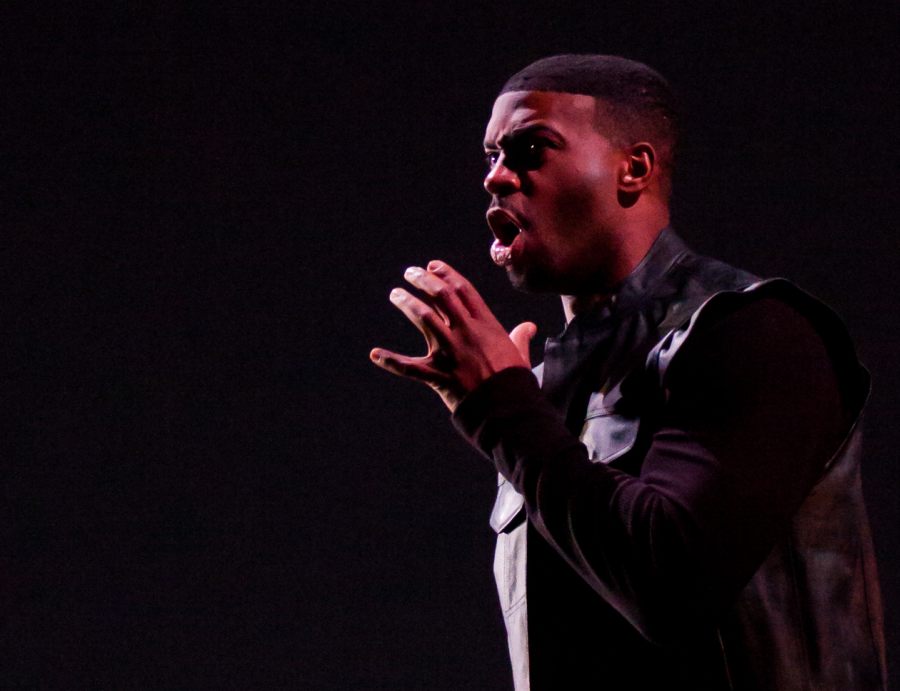One of the things that makes attending live opera exciting is the chance of discovering the unexpected. You might come in looking forward to a stirring overture from a famous composer like Verdi or a favorite aria you've listened to a hundred times, but there are always moments of delight when you are impressed by an insightful director's choice, a musical moment in the score you hadn't fully appreciated, or a performer who rivets the attention each time he or she walks on to the stage. Last night's production of Verdi's Macbeth by Kentucky Opera featured some of those moments, which always make for a satisfying experience.
This production features very good singers whose acting does justice to the dramatic story of one of Shakespeare's most popular tragedies. The burly Canadian baritone Gregory Dahl is fine throughout, bringing out the warring sides of Macbeth's character. He is at once the brutal warrior, incipient murderer, and the cowed husband, relentlessly ruled by the iron will of his wife, whose cajoling contains a high proportion of belittling and humiliation. So powerful is soprano Lyne Fortin's bloodthirsty Lady Macbeth, that you feel almost sorry for him. He is the first to unhinge after the murder of King Duncan and from then on it's a swift downward spiral to tyranny and brutishness.
Fortin does a wonderful job of delivering difficult arias that range widely in tone and style. She is downright scary in conjuring the powers of Hell to back up her plans, charming in the drinking song during the banquet scene. One of my favorite moments in that extended scene is her reprise of the toast after she has watched her husband very publicly cracking up. She fairly spits out the lyrics at him through her pasted-on smile. When we finally see madness overtaking her at the end, Fortin captures the pathetic crumble beautifully in the aria, "Una macchia è qui tuttora! - And yet, here's a spot!" After so many horrible deeds, she still manages to wring sympathy from the audience.
As good as the two leads are, the performer who stole the show was bass Solomon Howard as Banquo (pictured at top). His is the aforementioned happy surprise that makes you dig your elbow into your neighbor and whisper a "Wow!" Howard's regal stature is perfect for the loyal king's subject who begins to suspect Macbeth immediately. His voice is profoundly commanding and rich with nuance. When he is set upon and murdered after singing his last, "Come dal ciel precipita - O, how the darkness falls from heaven," you are truly sorry that he has been effectively silenced. The really important reviews always happen in line at the bar or randomly in the lobby. Everyone was talking about Banquo.
Other stand-outs are tenor Gregory Turay as Macduff, who has a moment to shine alone in his aria lamenting the murder of his family. And shining as an ensemble is the chorus, under the sure direction of Chorus Master Lisa Hasson. If you love a big choral show, this is the one for you. From the witches on the wild heath to Macbeth's court, the 30 or so voices are thrilling in unison, particularly the call for revenge after Duncan's death at the castle. I also appreciated the influence of Director Keturah Stickann's dance and choreography background in creating arresting scenes. The witches, especially, have a lot of complicated writhing, creeping, and eerie flow behind the scrim. And even in the court scenes, the chorus movements add naturalism and interest to the action.
Verdi's score is dark and beautiful, punctuated by dramatic pauses in the music when the cast sings without any accompaniment at all. Josesph Mechavich conducted the Louisville Orchestra, a familiar duo that provides a reliably pleasing performance from the pit.
The aspect of the production that bothered me was the overall design - not that the costumes weren't handsome or the projections well done in themselves, but that the elements didn't create a seamless whole. I don't have a problem with mixing period dress to underline the story's timelessness, but there were a few too many styles going on. Costumes of the court looked like characters stepping out of a late Victorian Henry James novel while the soldiers and peasants garb ranged from faintly Medieval to postmodern. The full-skirted uniforms of soldiers with knee boots suggested more Russian Cossack than Highlander. The spare set and modern graphical bars in red and white that played over the scrim mixed strangely with the gothic romance of projected castles and stormy heaths. It's as though two competing designs wound up being jammed together. I should note that both costumes and set were provided by Pacific Opera Victoria, and were not conceived by this director.
A few quibbles not withstanding, the production was entertaining and crowd-pleasing, a solid opening to the new season. Tickets are still available for the Sunday performance (2 p.m.) at the Brown Theatre. Call the Kentucky Center box office at 502-584-7777 or check online for details.
[Photo Credits: By Bill Brymer, courtesy of Kentucky Opera]

The final battle between Macduff (Gregory Turay) and Macbeth (Gregory Dahl).



